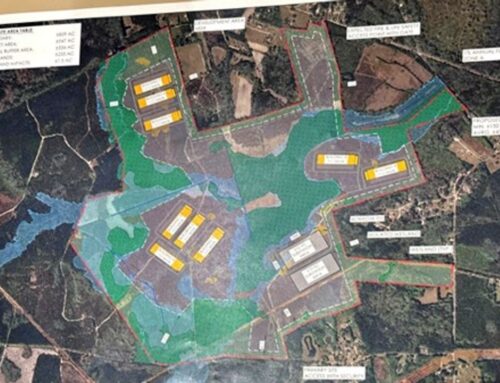The EPA also said it wants to reconsider some of the air quality standards Connecticut has been unable to meet — specifically, the fine particulate matter of the National Ambient Air Quality Standards . It could pave the way for more pollution by manufacturing operations and small businesses.
“How they can concurrently overhaul all these rules while they’re cutting funding and staffing by two thirds is a mystery,” said Brad Campbell, president of the Conservation Law Foundation, CLF, and a former EPA regional administrator and trial attorney at the U.S. Department of Justice. “It’s not possible for them to lawfully change this many, duly enacted rules, standards and protections without the staffing it would require to write the new rules, to take and respond to public comment and then defend those rules in court.”
Endangerment The endangerment finding is the wonky shorthand for a 2007 Supreme Court ruling – Massachusetts v. EPA , that led greenhouse gas emissions to be regulated under the Clean Air Act, a 1970 law that didn’t initially cover those emissions because they were then unknown. “Endangerment” referred to the mandate in the act regulating any air pollutant deemed to endanger “public health or welfare.”
Such regulation was implemented in 2009.
Zeldin called the endangerment finding “the holy grail of the climate change religion.”
Greenhouse gases are scientifically known to be the primary contributor to global warming and the climate change that results from it. The U.S. is responsible for the second highest total greenhouse gas emissions after China. But per capita, the U.S. is number one.
A just-released report by the World Meteorological Organization — which is affiliated with the United Nations — showed among its many findings that atmospheric concentrations of carbon dioxide, the primary greenhouse gas, are at the highest levels in the last 800,000 years; globally, each of the past 10 years were individually the 10 warmest years on record; each of the past eight years has set a new record for ocean heat content; and the rate of sea level rise has doubled since satellite measurements began.
Credit: World Meteorological Organization
What experts also pointed out repeatedly for almost all the EPA proposed rollbacks, and especially for endangerment, is that they would require going through a full rulemaking process, which is slow even without court challenges, which are likely in these cases. Endangerment would require overturning a U.S. Supreme Court decision.
“I think it’s going to be very, very hard to undo the endangerment finding even with courts that are highly skeptical of EPA,” said Josh Macey, who teaches environmental and energy law at Yale University, adding that people shouldn’t lose sight of the many other targeted rules, however, because they’re likely to fare much better in courts.
Any of the rollbacks would also require the kind of scientific expertise from the EPA to provide the rationale for such changes — something they may no longer have.
“They have a skeleton staff who doesn’t understand these laws, doesn’t understand the science and doesn’t understand the regulatory structure, all of which have to be dealt with,” said Roger Reynolds, senior legal director for Save the Sound and a former Connecticut assistant attorney general. “The science and the evidence is there. It’s only gotten stronger in the last several years.”
Indirect factors Dan Esty created Connecticut DEEP in 2011, serving as its first commissioner. He currently teaches across law, environment, management and global affairs departments at Yale. He has also served at federal and local levels and has long-espoused the need for efficiency in government and ongoing regulatory reform, including at the EPA.
“But that doesn’t mean that the way to resolve issues is to wipe everything out,” he said.
Daniel Esty Credit: Yale University
The Trump 2.0 team seems to be using several approaches, he said — challenging the rules as they’ve done with the endangerment finding and reinterpreting things.
“A third thing to do is to defund the people that would otherwise be required to implement programs so that there is a backlog of review required, a backlog of inspections, and that effectively slows down enforcement,” Etsy said. “And I think they’re pursuing all of those strategies in a way that is deeply disturbing.”
That lack of personnel and expertise can cut a few different ways. Slowing down enforcement could be considered a license to pollute — but industry would have to take a leap of faith that enforcers won’t catch up with them.
“It’s like playing five-dimensional chess,” Macey at Yale said.
By firing or creating conditions that cause staff attorneys and other agency officials to quit, he said, “you are definitely going to make it more difficult to enforce. On the other hand, if you just don’t enforce the law in some ways, that’s the equivalent of unwinding the regulation. On the other hand, it’s very hard for industry to know that that will happen. But I don’t think non-enforcement is a perfect substitute for unwinding rules.”
An EPA spokesperson, asked whether non-enforcement was part of EPA’s strategy, reiterated via email that the proposals are reconsiderations. “As such, we will undergo the rule making process and are bound by the Administrative Procedure Act and cannot prejudge the outcome.”
Another indirect factor emanates from the Supreme Court ruling last term overturning what was known as the Chevron deference . That case, Loper Bright Enterprises v. Raimondo, basically ended the ability of agencies like the EPA to promulgate rules Congress has not specifically authorized. But that decision also said the Supreme Court was not going to go back and review old agency decisions that had been based on Chevron, which means the decision cuts two ways.
“To the extent that the Trump administration wants to go back and unwind Biden and Obama decisions, Loper Bright does make their job harder,” said Macey, echoing the sentiments of other legal experts.
Roger Reynolds
Reynolds of Save the Sound made the point that some of the biggest, most iconic laws remain in place — the Clean Air Act and the Clean Water Act chief among them — with strong safeguards.
“Those foundational environmental statutes are so powerful and so clear and so results based. You have to clean up the air, and you have to demonstrate through science you’re cleaning up the air. You have to clean up the water. You have to demonstrate through science that you’re making progress until you achieve a healthy result,” he said.
One of the key components of both are their citizen suit provisions — citizens with standing can sue to make sure the laws are enforced.
“That was the genius of these environmental laws,” Reynolds said. “Groups like ours and citizens can bring direct enforcement actions against the polluters themselves. Or like the endangerment finding — if EPA tries to do something that’s in conflict with the law.”
Katie Dykes, Commissioner of Connecticut’s Department of Energy & Environmental Protection, speaks to the press about the state’s acquisition of a series of grants from the EPA’s Climate Pollution Reduction program at Union Station in New Haven on July 22, 2024. Credit: Ryan Caron King / Connecticut Public
The power in the states Those two laws in particular also provide a foundation for states to step into the void if the federal government steps back from or undoes environmental regulation. It’s something states have done before — including during the first Trump administration.
But the playing field may be more treacherous this time with fewer guardrails within the administration, a president who has threatened to financially punish states and others that don’t follow his dictates , and who seems to be undeterred by court rulings that tell him to do otherwise.
“The states need to demonstrate even bolder leadership. This is not a time when states should be backing down,” said CLF’s Campbell. “They may need to shift resources; they may need to expand the rights of citizens to enforce the law. But the worst thing that could happen is for state agencies to simply acquiesce when they should be filling the gap in leadership.”
States have more ability to do that than most people may know. It comes in the form of cooperative federalism, which in this case means it’s up to the states to implement the many provisions of the Clean Air and Water Acts.
“The federal EPA deciding not to enforce environmental laws does not eliminate states authority to enforce environmental laws, and so even federal decisions not to enforce is not a complete clean slate for industry,” Macey said. “If you really aggressively roll back the federal environmental laws, what you may do is actually free states to adopt more aggressive state-by-state, non-federal, but just ordinary state laws.”
Macey said he didn’t think industry would be particularly happy about a hodgepodge of regulatory requirements and enforcement mechanisms that differ by state. A single, tougher federal rule might be easier for them than 50 different ones.
A potential wrinkle is that the federal government provides money for the states to enforce the laws. It’s an open question whether the Trump administration would try to pull back the money for state implementation.
“I think that’s the intent of the Trump administration,” Esty said. “I think that’s what they’re doing. And so that will affect not only federal enforcement, but state implementation and enforcement as well.”
Connecticut is mindful of all this. As in other states, officials are wary of speaking out forcefully in opposition to Trump.
“It’s very concerning to hear the plans for significant reductions in EPA’s budget,” Dykes said. About one-quarter of DEEP’s full time positions are funded by the federal government — most of it by EPA. “We rely on a cooperative federalism model and close coordination, collaboration with the federal agency in order to do a lot of the work we have.
“There are many different linkages in terms of funding, in terms of authority, in terms of coordination, in terms of reliance on the science and the analysis done at the federal level. There’s many different linkages between the implementation programs.”
The good news, she said, are the efficiencies and beefed up staffing already implemented with the help of Biden administration funding and programs. She said there may, however, be the need to impress upon the Connecticut legislature that any slack may need to be picked up by the state.
She pointed to the importance of passing the governor’s climate resilience bill , and legislation that would continue clean energy development toward meeting the state’s greenhouse gas reduction goals. She said the next goal — a 45% reduction from 2001 levels by 2030 — would be hard to reach without federal support.
“It should be unambiguous that it’s the state’s time to step up,” said Reynolds of Save the Sound. “If the federal government is going away and being decimated and perhaps not able to function in the way it needs to function, then the state programs really need to step up.”
“The breadth is much greater than in the first Trump administration,” Dykes conceded, noting the change in the composition of the Supreme Court and some of its rulings since 2017. “I think that’s perhaps what has emboldened the Trump administration in the second term to reconsider things like the endangerment finding. So that’s really concerning. But at the same time, we’re also eight years farther along in terms of improvements.”



